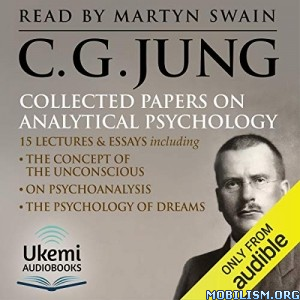Collected Papers on Analytical Psychology by Carl G. Jung
Requirements: .M4A/.M4B reader, 972.2 MB
Overview: Collected Papers on Analytical Psychology comprises a selection of key writings and lectures by Carl Gustav Jung produced between 1902 and 1916, which are presented in chronological order. As such they provide a fascinating exposition of the nature and essence of the psychological content of psychoses and neuroses, as explored and discovered by Dr Jung in the early years of his long and distinguished career.
The collection opens with ‘On the Psychology and Pathology of So-Called Occult Phenomena’ (1902) – a particular interest of the time; it continues with ‘The Association Method’ (1909), ‘The Significance of the Father in the Destiny of the Individual’ (1909), ‘A Contribution to the Psychology of Rumour’ (1911) and ‘On the Significance of Number-Dreams’ (1911). Psychoanalysis is specifically dealt with in three chapters, an essay, a lecture and a correspondence all dating from 1913. Other subjects are covered, including dreams and psychoses, and there is an extended essay on ‘The Psychology on the Unconscious Processes’, (1916, revised in 1917). The collection concludes with ‘The Conception of the Unconscious’, the lecture given in 1916 to the Zurich School for Psychology, with which Jung had become increasingly identified.
In a sense these early works could be considered a road map of Jung’s thinking on analytical psychology. In these later chapters (14 and 15) which contain many of Jung’s conclusions, we are given a fascinating description of a journey of investigation and discovery into the workings of the human mind and we can understand how Dr Jung developed his thinking pertaining to the ideas of introversion and extroversion, which have proved to be so essential and influential in the discipline of psychology.
Genre: Audiobooks > Non-Fiction
Jung also explains how, despite their well-documented differences of interpretation and their public falling out, he agrees with Freud that neurosis stems from repression, but he differs with the founder of the Vienna school regarding the origin of repression. Where Freud focused wholly on sexuality, Jung explains repression as resulting from a tendency towards a one-sided adaptation to the demands of life, determined by the extent of any given individual’s degree of introversion or extroversion. He contrasts the approaches of Freud and Adler, characterising them as focusing on infantile hedonism and power-seeking respectively. While accepting that these analyses may well be accurate very often, he ultimately considers them to be too reductive. Interestingly, he by no means rejects the importance of the role of sexuality in these processes, but rather repositions it. He does not accept its exclusivity and focuses on the importance of symbolism in mental life.
He regards causality as a point of view and the causal explanation of daily life is considered to be essentially mechanistic, contrasting it with the ‘final’ viewpoint. He dismisses the Freudian emphasis on the overriding role of sexuality and points out the functional importance of the symbol in the life of the mind and its importance to the further development of humankind. A PDF for download accompanies this recording. It provides detailed diagrams and tables used by Dr Jung as explanatory and supporting evidence for Chapter II, ‘The Association Method’.
Download Instructions:
https://ouo.io/re2k4SM
https://ouo.io/aKTVm8

